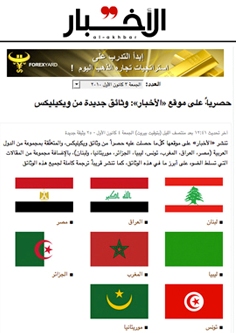Nearly 200 previously unreported U.S. diplomatic cables were posted on Thursday to the website of Lebanese newspaper Al Akhbar. The cables, from eight U.S. embassies across the Middle East and North Africa, have not appeared on Wikileaks’ official website or in the Western media outlets working with Wikileaks. Al Akhbar, which defines itself as an “opposition” newspaper, is published in Arabic. It has posted all 183 cables in their original English but promises readers a forthcoming Arabic translation.
 It’s unclear how Al Akhbar got the cables, which they say are “exclusive,” and whether they posted them with the permission of Wikileaks, which has tightly controlled who publishes which of its cables and when. Wikileaks offered a handful of media outlets, such as The Guardian and Spain’s El Pais, advance access to some cables on the condition that they coordinate release. But neither Wikileaks nor those media outlets have released the same cables posted by Al Akhbar. If Al Akhbar had coordinated their release with Wikileaks, it stands to reason that the Lebanese publication would have been granted sufficient advance time to translate the cables to Arabic.
It’s unclear how Al Akhbar got the cables, which they say are “exclusive,” and whether they posted them with the permission of Wikileaks, which has tightly controlled who publishes which of its cables and when. Wikileaks offered a handful of media outlets, such as The Guardian and Spain’s El Pais, advance access to some cables on the condition that they coordinate release. But neither Wikileaks nor those media outlets have released the same cables posted by Al Akhbar. If Al Akhbar had coordinated their release with Wikileaks, it stands to reason that the Lebanese publication would have been granted sufficient advance time to translate the cables to Arabic.
The documents appear to be authentic as the cables from Tripoli match up with The Atlantic’s background reporting for an earlier story on a 2009 Libyan nuclear crisis, some details of which The Atlantic did not publish but nonetheless appear in Al Akhbar’s cables. The rest of the cables are from U.S. embassies in Iraq, Egypt, Lebanon, Algeria, Mauritania, Morocco, and Tunisia. They portray U.S. diplomats as struggling to understand and influence the region’s oppressive and sometimes unpredictable regime.
One series of cables from Baghdad reports that Prime Minister Nouri al-Maliki replaced hundreds of his most experienced intelligence and security officials with under-qualified “political officers” in advance of the 2010 Iraq elections.
Another series from Beirut in 2008 shows Lebanese Defense Minister Elias al-Murr telling U.S. diplomats, in a message he implied they should pass on to Israeli officials, that the Lebanese military would not resist an Israeli invasion so long as the Israeli forces abided by certain conditions. Murr, apparently hoping that an Israeli invasion would destroy much of the Hezbollah insurgency and the communities in Lebanon’s south that support it, promised an Israeli invasion would go unchallenged as long as it did not pass certain physical boundaries and did not bomb Christian communities. A U.S. embassy official wrote, “Murr is trying to ascertain how long an offensive would be required to clean out Hizballah in the Beka’a.” Murr added that he had discussed the plan with then-Military Commandant Michel Sleiman, who has since become the President of Lebanon. The small but vibrant community of Middle East-based, English-language Arab bloggers have expressed outrage at Murr and Sleiman’s apparent invitation, predicting it will bring political disaster and possibly worse.
If Al Akhbar did not receive the cables from Wikileaks, it’s unclear whether the newspaper got them from a leak within Wikileaks or perhaps from a third-party source who wanted to beat Wikileaks’ planned release. But it appears that this is not the only such case of loose documents. Less than a week into Wikileaks’ gradual release of State Department cables, a process it is less than 0.25 percent through, the shadowy radical-transparency group seems to have lost control of its cables. Foreign Policy’s Josh Rogin reported on Wednesday:
One Washington lobbyist who represents countries in the Middle East said that local press in several countries he works on is reporting on cables that haven’t yet been reported on by the media outlets who had advance access to the documents. The lobbyist speculated that foreign governments may also be selectively leaking cables they’ve come across in order to spin them in their own favor before WikiLeaks or local media has a chance to weigh in.
“New leaked cables are coming from weird sources, think tanks, the countries involved. There’s a lot of stuff being quoted in local press from cables that haven’t been released yet and I have no idea where they are coming from,” this lobbyist said.
It remains to be seen if Al Akhbar will translate the cables for its Arabic readership or even keep them posted online. Much like Wikileaks.org, which has gone down several times since posting the cables and had its hosting pulled at least twice, Al-Akhbar.com has been increasingly difficult to load since it posted the cables. While that could be the result of a spike in traffic, media attention on Al Akhbar’s exclusive cables has been relatively sparse. But, for the moment, you can still view all 183 cables here.
Leave a Reply
You must be logged in to post a comment.